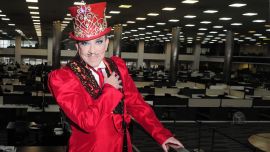Juntos por el Cambio national deputy Luciano Laspina analyses, with hindsight, the four years of the Mauricio Macri government with an eye to the 2023 elections.
The 49-year-old, tipped by some to be a future economy minister, highlights the role of Javier Milei in public debate and urges Argentina to undertake the necessary reforms to ensure sustainable economic growth over time.
How can Juntos por el Cambio reach consensus over a common economic plan, which is basically a plan for co-government, for presentation in next year’s elections, given the differing visions of how much state among the different coalition members?
Some weeks ago the three or four main think-tanks of Juntos por el Cambio [Fundación Hannah Arendt of the Civic Coalition, Fundación Alem for the Radicals, PRO’s Fundación Pensar and Miguel Pichetto’s Peronist republican foundation] have started work on the broad lines for a government programme of consensus. Of course there will be shades of difference in the future but basically we must spell out in black and white the broad lines of a future government, a task which must be done when faced with the challenge of governing Argentina with grand coalitions, which is our current political system, or at least the one which has emerged.
What would be the challenge which neither this ruling coalition nor the last could resolve, both reaching government more as an electoral alliance without a unified plan?
The current Frente de Todos experiment has been a much bigger failure because there is open war between the president and vice-president. In the case of our 2015-2019 experience, that functioned very well with a very strong leadership from then-president Macri. There was indeed some dissidence over the programme, at least regarding the speed with which we should go through with the reforms. But all in all, it worked pretty well for the challenges then. In any case more than political failings there were technical flaws in the organisation of the sequence of the reforms which Argentina needed.
During the Macri government the dissidence was muzzled simply because there was one man in charge but it remained underlying and emerges today because the division of power is more horizontal. In an interview I had the other day with [Senator] Alfredo Cornejo, he said that he dissented with his own Radical party, concretely with his successor as party chairman, [Jujuy Governor] Gerardo Morales, with respect to his own belief that first you must produce and then distribute while for many of his party colleagues it is the other way round. I would imagine that the differences within PRO are less, but in any case the Radicals are not minor partners within Juntos por el Cambio. How do you amalgamate whether to distribute or produce first?
I feel that Argentina is a century behind with these debates. The logic of a model giving priority to distribution is that it has proved to be a machine for generating poverty and inequality in the distribution of income. Basically a country which does not generate jobs nor exports nor investments nor savings because it has no currency is a country which finds it impossible to improve the living conditions of its population. This is a basic principle, afterwards you can work on specific policies geared in one direction or the other, the distribution of income via taxation, fundamentally via the spending more than the taxation, a basic principle of public finances.
In general, taxes have to be efficient with revenue potential in order to distort the economic signals as little as possible, complying with distribution via public spending. Now we are doing the complete contrary. We have highly extortionate and regressive taxes while the distribution of public spending, above all the subsidies, is also absolutely regressive so that we’re getting everything wrong. These days there is a much clearer diagnosis, beyond the viewpoint of any one leader, in society at large, in the political leadership and in the business community that this model is exhausted and has to be transformed at root. I’m referring to the populist model inaugurated by Kirchnerism as from 2003, with different shades of emphasis in an increasingly intensified process, which consists of increasing taxation and public spending to finance a presumed redistribution of income which only ends up generating less growth, more inflation and more poverty. This diagnosis is much clearer than it was in 2015 when there was a sense that corrections had to be made because the policy of subsidies was out of control, because the fiscal deficit was very high, etc. and inflation was also very high. But there was not the degree of deterioration of the socio-economic model which can be observed today, as is already clear to most of the population.
The big advantage as against 2015 is precisely that this consensus is growing. The disadvantage is that the socio-economic inheritance which we are going to receive in 2023 is much worse than the one received in 2015. The only advantage which we’ll have will be the starting conditions. There will be a much more explicit crisis in the eyes of society than there was in 2015, a much clearer exhaustion of this model and, above all, parliamentary majorities which we did not have in 2016. Then we had a third of the Chamber of Deputies and a fifth of the Senate – today the scenario departs from a base of Juntos por el Cambio reaching a modest 40 percent, our historic floor in recent elections, we’ll have no less than 121-122 deputies, i.e. within seven deputies of quorum, and no less than 35 senators, within two senators of quorum. That is a fundamental difference in how the government can approach the possibility of reforms. The shades of difference within the governing coalition will be overshadowed by what is going to be a crisis of vast social and political magnitude and a very clear demand from society for a complete U-turn in Argentina’s economic policies.
Do you think that this change in society can somehow be partially explained, whether as cause or effect, by the growth of Milei?
Yes, Javier was the first to somehow say aloud that the emperor was naked. He spoke about the state deficits with a media punch which we in Juntos por el Cambio lacked to express all that. Primarily because we abused euphemisms for a long time because both society and the politically correct Zeitgeist when we entered government were very different from today. There was not such a clear awareness of the socio-economic damage done by Kirchnerism and the impossibility of growing with their model of so-called distribution, which represses exports, investments and jobs and at the same time tries to pump up public spending.
Milei expresses two things, especially anger with the political class after many years of failure and that demand by society to make visible what is pretty evident for many Argentines. As was done in the 1980s by Alvaro Alsogaray, who was not exactly a John Fitzgerald Kennedy – he was a fairly grey politician with few communicational skills and limited charisma. Nevertheless, he managed to reach a very important sector of society with his message to such an extent that he became the third force nationwide before joining the government of president Carlos Menem. That happened because he was the first to express what society saw: that the model of a mega-state, a society drained by taxation and a regulated, closed and inflationary economy had been exhausted for many years, probably since 1975, but nobody had dared to bell the cat. That is what Milei expresses and up to that point he has made a great contribution.
I aspire to his contribution continuing to be positive for the Argentine political system in terms of being able to constitute an option and an engine room for pro-market liberal ideas, instead of turning into part of the old problem of populism in Argentina.
You made a comparison with Alsogaray, who ended up becoming the third force, taking public discourse in a more conservative and traditional direction and even later joining the government of the winner. Do you think that history can repeat itself with Milei? That he does not make it to being a government alternative but places on the public agenda issues which those who do govern can incorporate, permeating society in that direction.
Would that it were so. He has made a huge contribution to the debate and his role has to be that. Later on, given time and to the degree that his political force matures, he might perhaps become an option of government, if the political process and his own political maturity lead him to feel that he really can make a contribution. Given Javier’s personal characteristics, it’s going to be a very personal decision where he has to feel comfortable making a contribution to the transformation of the country and the application of those ideas.
Let’s talk about the different visions within PRO: [Carlos] Melconian is not currently a party member but [PRO chair] Patricia Bullrich said that she would like him to be her economy minister, while Macri said that he would like you to be minister. Are the lines of either of the above different from [ex-minister Hernán] Lacunza?
There are no differences with respect to the course. In many cases economic teams are assembled according to track records in common or visions shared at certain moments – it does not necessarily have anything to do with basic differences, no. They could easily converge into a common programme.
One of the problems which Argentina has had is precisely the lack of good economic teams, which often has resulted in a president during moments of crisis going out to look for a minister who shows up along with two university pals. Running through the last seven cases, including those of Juntos por el Cambio – which was initially different because there were economists like Federico Sturzenegger who had been working a long time with Mauricio Macri but [Alfonso] Prat-Gay, for example, put together his team more or less on the trot – the most recent appointments have been basically along those lines. This has to do with a very profound problem, namely that government think-tanks have disappeared in Argentina. The collapse of 2001 not only swept away the political parties but also the major government think-tanks like Cedes, the Fundación Mediterránea, FIEL, CEMA and so many others, which were economic teams with academic tasks, cyclical analysis, public policy research but also government cadres. When that disappeared, which has much to do with the desertion of the establishment – something I have criticised within closed circles – other public policy think-tanks which do not train government or economic teams appeared. That has originated two or three problems, not only the lack of prepared and consolidated teams with carefully elaborated plans and proposals upon entering government, but an interruption of the dialogue between the political and academic worlds. Because when not having that channel of trained government cadres to be interlocutors with the academic world, that natural connection is lost, with much pauperisation of political debate.
My idea, as I’ve been saying for a long time – to Macri, Patricia [Bullrich] and Horacio [Rodríguez Larreta] among others – is that to have more than one economic team, you have to water many plants because then a fuse blows and there are no spare parts. It’s not an issue of jurisdictions or personal posts, it’s an issue of how we are going to make the best contribution to Argentina.
This morning I was telling Ricardo López Murphy that it is much better having multiple teams thinking about the problems with different visions and approaches, trained to enter government because that way we can go polishing up the debate in the transition. Afterwards the president, whoever that might be, can pick the best prepared team and, if not to their taste, there will be another.
What Melconian is doing in Fundación Mediterránea seems like that, going to a foundation to construct an economic model and a team.
Carlos at the Fundación Mediterránea is perhaps a tardy reflection in terms of an important sector beginning to realise what kind of instruments or tools are needed in society. The same thing is happening with the team which Hernán Lacunza is assembling with Guido Sandleris and also with the economic team which I head and the foundation which I am creating to be able to lead and organise this economic team. That’s very healthy for Juntos por el Cambio and for Argentina.
There are also Radical teams which are starting to get down to work and which surely would be able to merge later on. When [Domingo] Cavallo arrived with the Fundación Mediterránea, the Central Bank governor was Roque Fernández who belonged to CEMA, a different think-tank but nevertheless ended up heading the Central Bank. That was because there was a confluence of ideas in the different think-tanks which afterwards converged in government and coexisted very well. The important thing is that this is not a short sprint up to 2023 and that this incipient process of understanding that this type of organisation and this type of political and technical cadres are necessary will mature far beyond 2023 because the worst which could happen is that we race to finance four or five papers from here to 2023 with the result that in 2024 we run into the same problem of everything having disappeared. This is a message more to the business community, the elites, the establishment – call them what you like – than to the politicians.
How will we reach first the PASO primaries next August and then the elections next October in terms of the economy, inflation, the exchange gap and the gross domestic product?
Argentine growth will fall off that year, over and above the statistical lag which will be very high due to the post-pandemic recovery left over from 2021 and 2022. We are going to have a recession from end to end, probably with accelerating inflation, despite the good terms of trade.
In concrete terms the statistical lag would give a growth rate of three percent.
Above three percent if there is no growth. We would be statistically up by over three percent on average so that the economy this year will very probably be falling fast between 1.5 and two percent.
That would imply a fall of four or five percent in the second half of the year.
The slump will fundamentally come in winter due to the heavy cuts in industrial output, part of which can be regained and part not, in the second half of the year, due to the shortfalls of gas which are already leading to cuts being programmed for industry and it is very probable that they will become far more acute in winter. This will be a recessive factor. But accelerating inflation is another factor which will surely condition growth, leading to rising interest rates and, above all, more uncertainty.
It is very probable that the stagflation which Argentina has been undergoing for over a decade will become more acute this year as the electoral transition approaches. Each day the market eyes with much more uncertainty what might happen with the renewal of the debts which accumulate month after month. There is a pretty clear difference between next year’s electoral process and what happened in 2015, when the two pro-market candidates in Argentina were Daniel Scioli, with the great Miguel Bein, and Mauricio Macri, who at that point had Carlos Melconian lined up as a possible minister. Somehow they financed the transition for Cristina so that everything did not blow up in her face, precisely because Argentina enjoyed great credit for what could come after the populist experiment. But of course the four years of Macri with the return of populism in 2019 dynamited that credit so that such expectations will not be there.
So that people bring forward the growth and start investing a year ahead…
Exactly, saying: “Now the problems will be solved by changing the political label,” so that Kirchnerism in its fourth administration will not enjoy that great benefit often accruing to populism. The situation will be very complicated. I don’t want to be alarmist because now there is a kind of race to see who can be the most alarmist.
related news

Juan Sebastián Verón, AFA’s adversary, takes Estudiantes to Clausura triumph

Argentina climbs Pornhub rankings as women overtake men in viewing

Milei's law for (removing) glacier protection is a regressive reform




















Comments